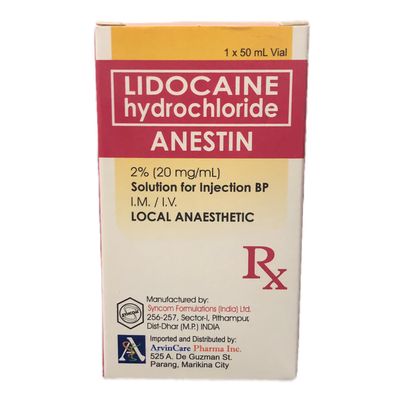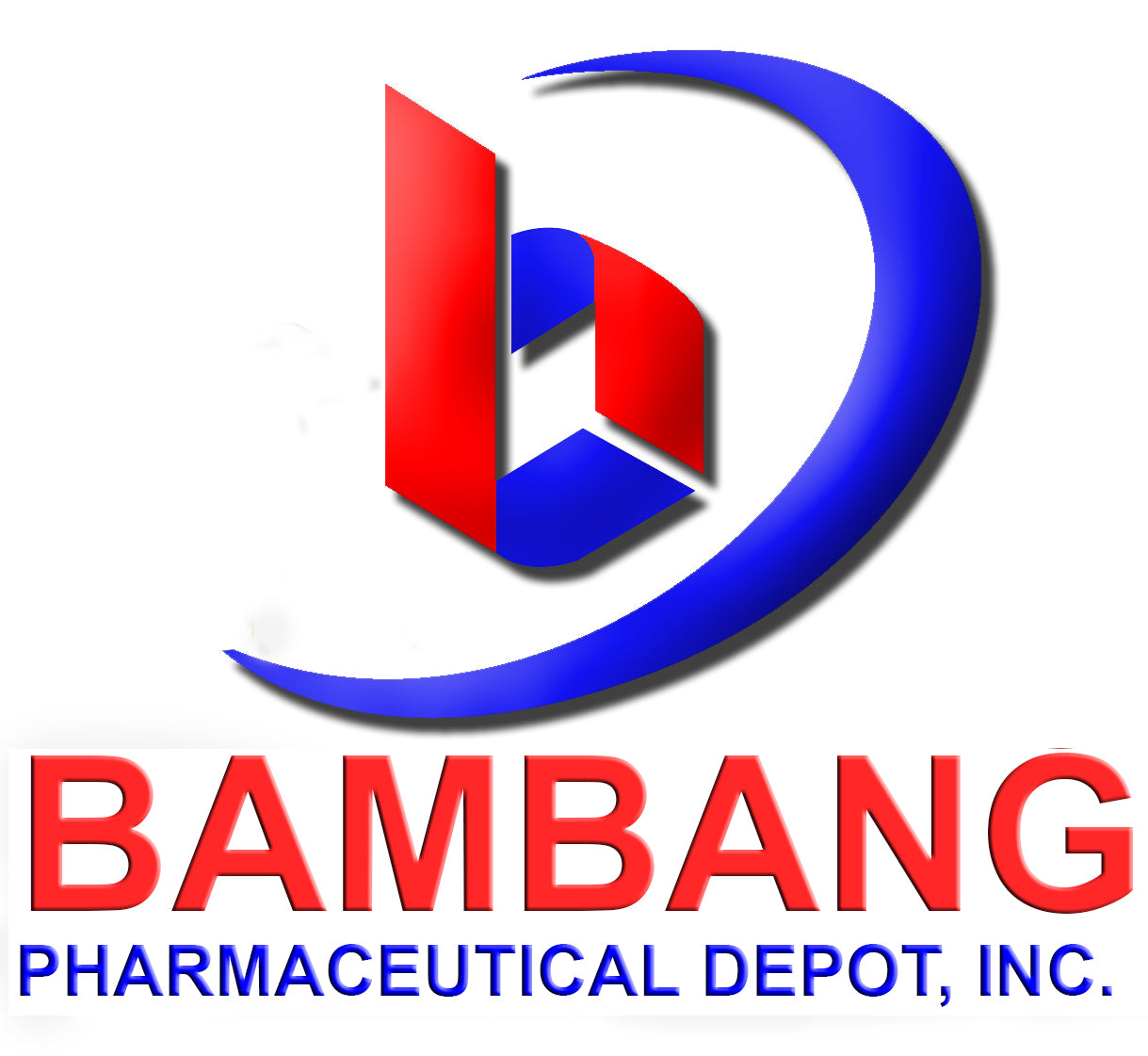Bambang Pharmaceutical Depot Inc.
Lidocaine Hydrochloride (Anestin) 2% 20mg/ml Solution for Injection BP I.M/I.V Local
Lidocaine Hydrochloride (Anestin) 2% 20mg/ml Solution for Injection BP I.M/I.V Local
Couldn't load pickup availability
Description:
Used to provide local anaesthesia by nerve blockade at various sites in the body and in the ionic control of dysrhythmias. It acts by inhibiting the ionic refluxes required for the initiation and conduction of impulses, thereby stabilising the neuronal membrane.
Product Description:
Lidocaine Hydrochloride (Anestin) 2% 20mg/ml Solution for Injection BP is a local anesthetic used to prevent and treat pain during surgical, diagnostic, and medical procedures. It contains Lidocaine Hydrochloride, a amide-type local anesthetic that works by blocking nerve signals in the body, thereby numbing the area where it is injected. This formulation is available as an injectable solution for intramuscular (I.M) and intravenous (I.V) administration, providing both local and regional anesthesia.
Anestin 2% solution is designed for use in a clinical setting under the supervision of a healthcare professional. It is commonly used in minor surgeries, dental procedures, and other situations requiring localized numbness to reduce pain.
Key Features:
-
Active Ingredient: Lidocaine Hydrochloride 20mg/ml (2% solution).
-
Formulation: Injectable solution for I.M and I.V administration.
-
Local Anesthetic Action: Blocks nerve conduction to provide temporary numbness and pain relief.
-
Versatile Use: Suitable for various medical procedures including local anesthesia, regional anesthesia, and nerve blocks.
-
Fast-acting: Provides rapid onset of anesthesia.
Indications:
Lidocaine Hydrochloride (Anestin) 2% solution is indicated for:
-
Local Anesthesia:
-
For local anesthesia in minor surgical procedures, dental work, and diagnostic or therapeutic procedures.
-
-
Regional Anesthesia:
-
For nerve blocks or regional anesthesia to anesthetize a larger area of the body, especially for certain types of surgery.
-
-
Intravenous Regional Anesthesia (Bier’s Block):
-
Used in a specific technique for limb surgery where a tourniquet is applied to limit the anesthetic to the limb.
-
-
Emergency Treatment of Ventricular Arrhythmias:
-
It may be used intravenously to treat ventricular arrhythmias, such as in cases of cardiac arrest.
-
-
Pre-Operative Analgesia:
-
Provides relief from pain or discomfort in the perioperative period before surgery or invasive procedures.
-
Dosage:
The dosage of Lidocaine Hydrochloride (Anestin) 2% solution will vary depending on the procedure and the patient's condition. General guidelines are:
-
Local Anesthesia:
-
Adults: For local infiltration, the typical dose is 1 to 5ml (20 to 100mg) of 2% Lidocaine depending on the area to be anesthetized.
-
Maximum Dose: The total dose should not exceed 300mg (15ml of 2% solution) for a single procedure.
-
-
Nerve Blocks:
-
Adults: For nerve blocks, the dose ranges from 3ml to 10ml (60mg to 200mg) depending on the site and the type of block.
-
-
Intravenous Regional Anesthesia (Bier's Block):
-
Adults: Typically, 40-50ml of the 2% solution (80-100mg) is administered via intravenous injection into the limb, following tourniquet application.
-
-
Ventricular Arrhythmias (IV administration):
-
Initial dose is typically 50-100mg (2.5-5ml) intravenously. It can be repeated every 5-10 minutes, up to a total of 300mg if necessary, depending on the patient's response.
-
Administration:
-
For I.M (Intramuscular): Inject slowly into a muscle.
-
For I.V (Intravenous): Administer as a bolus injection or via slow infusion as per clinical requirements.
-
Note: The dosage must be adjusted based on the procedure and the patient’s individual response, medical condition, and weight.
Side Effects:
Common side effects of Lidocaine Hydrochloride (Anestin) 2% injection include:
-
Local Reactions:
-
Pain, redness, or swelling at the injection site.
-
-
Systemic Reactions (especially with overdose or rapid administration):
-
Dizziness, drowsiness, or confusion.
-
Tinnitus (ringing in the ears).
-
Blurred vision.
-
Nausea and vomiting.
-
Twitching, muscle tremors, or convulsions.
-
-
Cardiovascular Effects:
-
Bradycardia (slow heart rate), hypotension (low blood pressure), and cardiac arrhythmias.
-
-
Respiratory Effects:
-
Respiratory depression or difficulty breathing in high doses or overdose situations.
-
-
Allergic Reactions:
-
Rash, hives, itching, or in rare cases, anaphylaxis (a severe allergic reaction requiring immediate medical attention).
-
Contraindications:
Lidocaine Hydrochloride (Anestin) 2% solution is contraindicated in the following conditions:
-
Hypersensitivity to Lidocaine:
-
If the patient is allergic to Lidocaine or any of its components, the medication should not be used.
-
-
Severe Heart Block:
-
In patients with complete heart block or other severe conduction disturbances unless a pacemaker is in place.
-
-
Severe Liver Disease:
-
Caution is required in patients with severe hepatic impairment, as Lidocaine is metabolized by the liver.
-
-
Allergic Reactions to Local Anesthetics:
-
Lidocaine should not be used in individuals with a history of allergic reactions to local anesthetics, particularly amide-type anesthetics.
-
-
Acute Porphyria:
-
Lidocaine should be avoided in patients with acute porphyria due to potential worsening of the condition.
-
Warnings and Precautions:
-
Cardiac Effects: Lidocaine can cause arrhythmias, especially in patients with pre-existing heart disease or those who have received high doses.
-
Central Nervous System Effects: Overdosing or rapid administration may lead to seizures, convulsions, or respiratory depression.
-
Monitor for Toxicity: Always monitor patients for symptoms of toxicity, especially when high doses are used. Symptoms may include confusion, dizziness, and twitching.
-
Pregnancy Category B: Lidocaine has been classified as Category B for pregnancy (it should be used with caution during pregnancy and only when necessary).
-
Breastfeeding: Lidocaine is excreted in breast milk, so use with caution in breastfeeding mothers.
Drug Interactions:
-
Beta-blockers (e.g., propranolol) may increase Lidocaine plasma concentrations, requiring dose adjustments.
-
Cimetidine (an H2-receptor antagonist) may increase Lidocaine levels in the blood.
-
Phenytoin (an anticonvulsant) may increase the risk of Lidocaine toxicity when used concurrently.
-
Class III antiarrhythmic drugs (e.g., amiodarone) may increase the risk of arrhythmias when used with Lidocaine.
-
Other local anesthetics: Caution should be taken when used in combination with other local anesthetics to avoid cumulative toxicity.
Storage:
-
Store Lidocaine Hydrochloride (Anestin) solution at room temperature (15°C to 30°C).
-
Protect from light and avoid freezing the solution.
-
Keep the product in its original packaging to prevent contamination and degradation.
-
Keep out of the reach of children.
Conclusion:
Lidocaine Hydrochloride (Anestin) 2% Solution for Injection is a local anesthetic used for providing pain relief during a variety of procedures requiring anesthesia. Its fast onset and effectiveness make it a widely used agent in both local and regional anesthesia. It also has applications in ventricular arrhythmias, making it a versatile medication for use in clinical settings. However, due to the potential for systemic side effects, it must be administered carefully, especially in patients with pre-existing conditions or those receiving high doses. Always follow medical advice and dosing instructions to ensure safety and effectiveness.
Share

Product Features
Highlights
Details
Lot #
Expiry Date
"For All Your Pharma And Medical Supply Needs"
-
MEDICINES
We offer large range of generics and branded tablets, capsules, topicals, suppositories, drops or suspensions, inhalers and injections.
-
SUPPLEMENTS
High quality yet very affordable vitamins and minerals, specialty supplements, herbals and botanicals, sports nutrition, and weight management.
-
MEDICAL SUPPLIES
We serve all types of medical supplies needed in clinics, laboratories, and hospitals like cottons, gauze, alcohol, swabs, gloves, bandages, lancets, glucometer, etc.
-
MEDICAL EQUIPMENT
We also serve durable and affordable medical devices and equipment needed in clinics, laboratories and hospitals.
Subscribe to our emails
Be the first to know about new collections and exclusive offers of Bambang Pharmaceutical Depot Inc.


